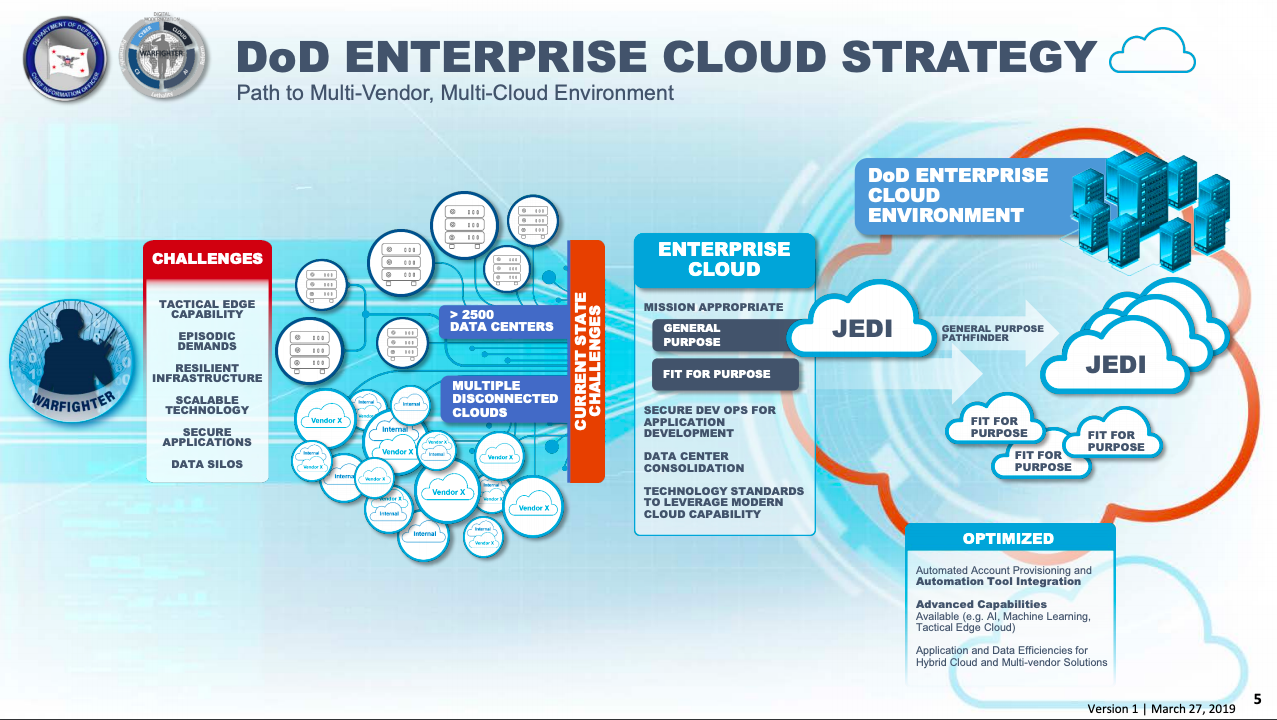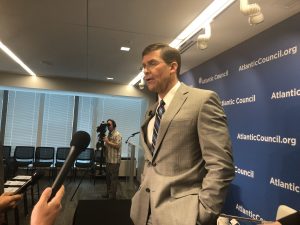Oracle’s Hail Mary Appeal Against JEDI
Posted on

The Pentagon’s plan to consolidate many — but not all — of its 500-plus cloud contracts into a single Joint Enterprise Defense Infrastructure (JEDI). Note the suggestion that the single “pathfinder” contract for JEDI might evolve into multiple JEDI contracts.
With nothing to lose, Oracle took one last shot yesterday at the Defense Department’s $10 billion JEDI cloud competition, filing an appeal against last month’s court ruling against the company. In its statement about the new appeal, however, Oracle appears to bend the words of Court of Federal Claims Senior Judge Eric Bruggink in his 60-page ruling to their benefit.
The most obvious discrepancy? Oracle says Bruggink called the procurement, as structured, “unlawful.” But that word doesn’t show up once in those 60 pages.

Oracle headquarters in Redwood City, California.
Here is Oracle’s full statement, attributed to the company’s general counsel Dorian Daley (we’ve bolded key words for emphasis): “The Court of Federal Claims opinion in the JEDI bid protest describes the JEDI procurement as unlawful, notwithstanding dismissal of the protest solely on the legal technicality of Oracle’s purported lack of standing. Federal procurement laws specifically bar single award procurements such as JEDI absent satisfying specific, mandatory requirements, and the Court in its opinion clearly found DoD did not satisfy these requirements. The opinion also acknowledges that the procurement suffers from many significant conflicts of interest. These conflicts violate the law and undermine the public trust. As a threshold matter, we believe that the determination of no standing is wrong as a matter of law, and the very analysis in the opinion compels a determination that the procurement was unlawful on several grounds.”
And here’s the official response to Oracle’s appeal, sent to us today by Department of Defense spokesperson Elissa Smith:
“DOD is aware of Oracle’s intent to appeal and will review it along with the Department of Justice. As DOD has asserted throughout this litigation, and as confirmed by the court, DOD reasonably evaluated and equally treated all offerors within the framework of a full and open competition. DOD’s priority remains delivering critically needed capabilities to the warfighter while protecting taxpayer resources.”
So who’s telling the truth?
Before breaking down Oracle’s statement, here’s a quick review of how we got here. In late 2017, then Deputy Secretary of Defense Patrick Shanahan issued a memorandum saying that a DoD-wide enterprise cloud that could support unclassified, secret, and top secret requirements was fundamental to its modernization efforts. He called for its accelerated adoption using commercially available cloud solutions under the 10-year $10-billion Joint Enterprise Defense Infrastructure (JEDI) cloud acquisition program.
The final JEDI Request for Proposal was issued in July 2018, with four qualified proposals received by the October 2018 deadline from Amazon Web Services, IBM, Microsoft Azure, and Oracle America. In April 2019, DoD downselected AWS and Microsoft to continue the competition. Oracle protested to the Court of Federal Claims, but in July, Judge Bruggink denied Oracle’s protest. He wrote that it was appropriate to ultimately award JEDI to a single company, and even though he said there was a whiff of conflict of interest in the competition, it wasn’t enough to overcome Oracle’s inability to meet all of the key qualifications necessary to compete. He cited the Pentagon’s reasons for rejecting Oracle’s bid as sound.

Army Secretary Mark Esper talks to reporters at the Atlantic Council.
At that point, and after President Donald Trump’s repeated disparagments against Amazon and its owner Jeff Bezos, Secretary of Defense Mark Esper stepped in to review the entirety of the JEDI cloud competition. That’s part of the reason it will no longer be awarded by the end of August as both the Pentagon and industry had expected. Pentagon CIO Dana Deasy said the Defense Department won’t award a contract until Esper’s review is finished, but he also didn’t expect it to take too long.
So let’s break down Oracle’s statement and compare it to Bruggink’s extensive ruling to see if it is anything more than a Hail Mary or delaying tactic.
Oracle dismisses its lack of standing and its inability to meet JEDI’s basic contract requirements as “legal technicalities.” RPFs are typically very clear, however, that if a company doesn’t meet or sufficiently address the Technical Requirements volume in an RFP or Statement of Work — which in the case of JEDI specified the “gate criteria” required — than it likely won’t win the contract.
Judge Bruggink’s ruling here? “[I]t is now possible to determine whether Oracle had a substantial chance of winning this award,” he wrote. “We have the necessary factual predicate, because Oracle’s proposal was evaluated and excluded from competition based on its failure to meet Gate Criteria 1.1 and Oracle concedes that it also could not meet Gate Criteria 1.2. Thus, while Oracle meets the most basic element of standing—it submitted a serious proposal—we have to consider whether it was prejudiced, even if some of its substantive arguments are valid.”
Note the word “prejudiced,” as it addresses Oracle’s other claims claims, as well. “Because the court finds that Gate Criteria 1.2 is enforceable, and because Oracle concedes that it could not meet that criteria at the time of proposal submission, we conclude that it cannot demonstrate prejudice as a result of any other possible errors,” said the ruling.
In addition, Oracle claims that the procurement was bedeviled by significant conflicts of interest that violated the law when certain Pentagon employees who played a role in the JEDI procurement have since found jobs at Amazon.
On that matter, the court ruling states, “In short, the merits of Oracle’s arguments are wrapped around the axle with the prejudice question. We believe the tidiest approach, therefore, is to deal with the merits of Oracle’s arguments, and if any survive, determine if they are nevertheless off limits because Oracle cannot demonstrate that it was prejudiced.”
Oracle argues that federal procurement laws prevent single awards at a certain cost threshold unless one or more or six specific exceptions are present, and that the court did not find such exceptions. The judge’s ruling, however, states clearly that the contracting officer (CO) identified three specific exceptions that favor a single award – when it offers better price and more favorable terms, lower administrative costs, and a blanket “best interests of the Government” clause. What’s more, Bruggink said those exceptions were sound.
“The regulation is unambiguous: even in light of the multiple award preference, [t]he contracting officer must not use a multiple award approach if one of six listed conditions exists,” Bruggink wrote. (Emphasis ours). “The question is whether the CO rationally determined that any of the three chosen conditions exist. We believe she did. Plaintiff offers us no real no basis for questioning any of these conclusions. They were completely reasonable, and we have no grounds to disturb her conclusion that multiple awards cannot be used.”
So far, despite Oracle’s predictions, the Force has been with JEDI.
Subscribe to our newsletter
Promotions, new products and sales. Directly to your inbox.
